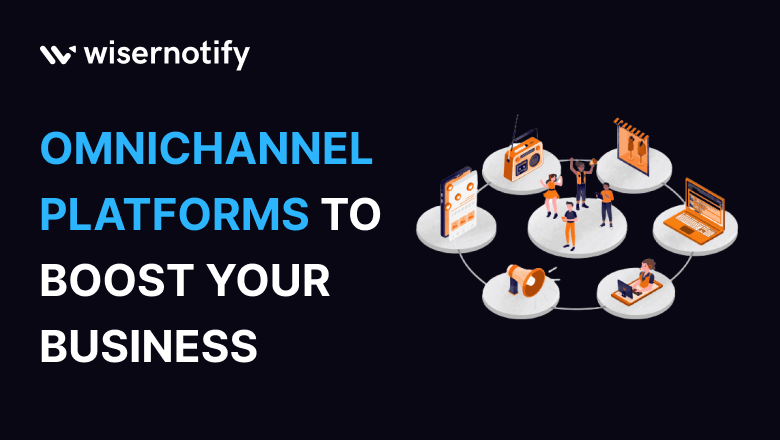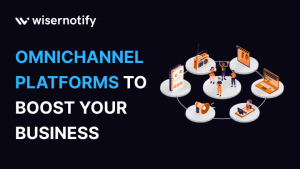Looking for the best Omnichannel platform in 2025?
We’ve spent over 12 hours finding and curating this list based on user reviews, support, testimonials, and use cases.
Before starting, here are the stats showing that omnichannel marketing can increase sales by up to 287%, to prove its impact.
In the increasingly competitive world, businesses must have a solid online presence and provide customers with a seamless shopping experience.
That’s where omnichannel marketing platforms come in.
The omnichannel platform offers a range of channels, tools, and technologies for connecting with customers across different channels.
This omnichannel marketing platform can help you sync your offline stores, online stores, and other channels, providing a consistent shopping experience and customer satisfaction.
Whether you’re a small business just starting or a large enterprise looking to expand across different sales channels, these 12 top omnichannel platforms can help you take your business to the next level and provide your customers with a consistent brand experience.
Here’s a quick summary of the platforms covered in this article:
1. Desku: AI-powered customer support platform with live chat, email, and social media integrations.
2. Adobe Experience Cloud: Comprehensive cloud-based solution for managing and optimizing customer experiences.
3. GetResponse: A versatile platform for email marketing, automation, and conversion growth.
4. Glassix: AI-powered tool for improving customer engagement across various channels.
5. Priority Software: Cloud-based ERP system for streamlined multi-channel business management.
6. Revealbot: Automation platform for managing and optimizing paid ad campaigns.
7. Shopify Plus: E-commerce solution with advanced customization and automation features.
8. BigCommerce Enterprise: E-commerce platform integrating online and offline sales channels.
9. NewStore: Mobile-first omnichannel platform with POS and inventory management.
10. Oracle CX Commerce: Cloud-based CRM and e-commerce solution for B2B and B2C brands.
11. Freshworks – FreshDesk: All-in-one CX platform for delivering stellar customer service.
12. Omnisend: E-commerce-focused platform for automating email and SMS marketing campaigns
Visitors leave your website without taking action?
They don’t trust your site or feel urgency to act. WiserNotify builds both, turning doubt into action & visitors into customers.
1. Desku
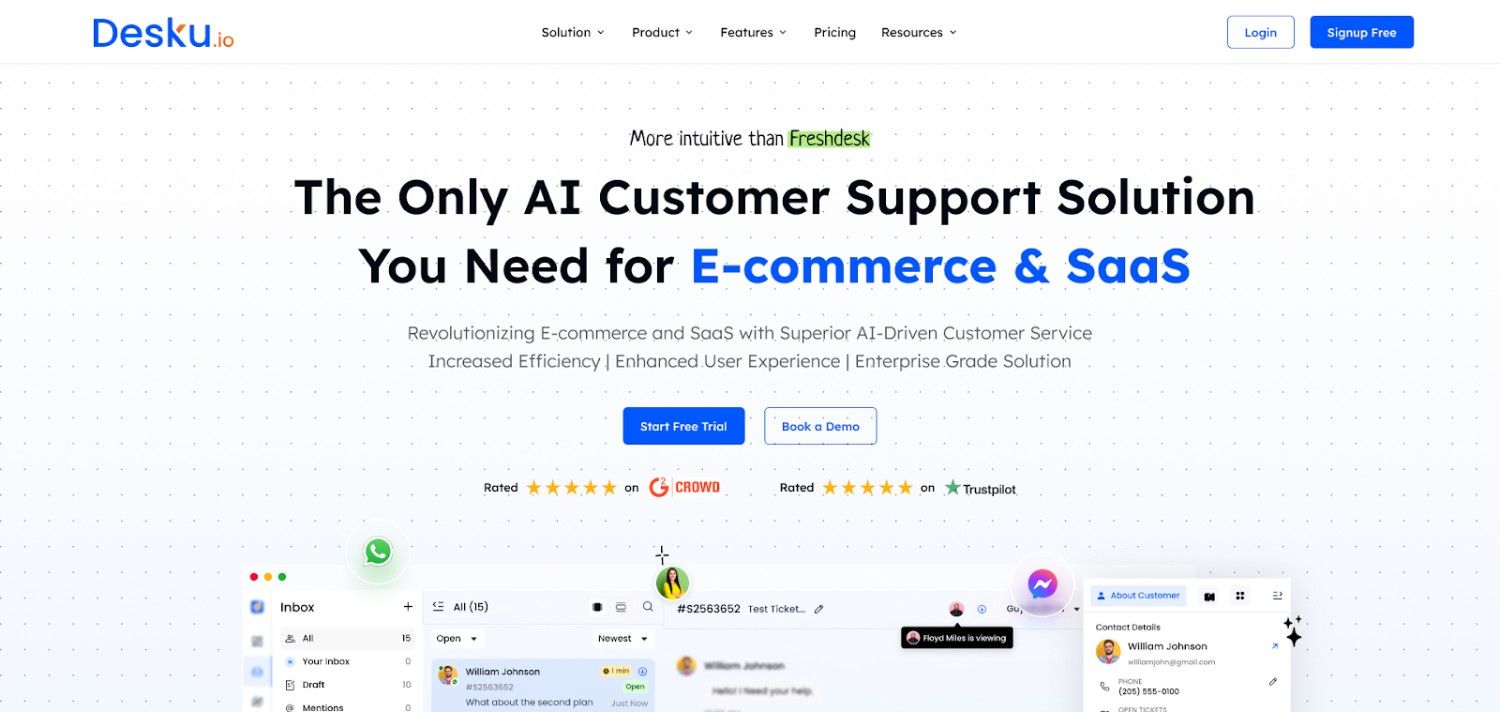
Desku has a 4.7-star rating on G2 and 4.8 on the Shopify app store.
Desku.io is one of the best Omni Channel Customer support platforms designed to enhance and automate customer support for e-commerce and SaaS businesses.
Desku helps businesses by automating customer support through AI, managing interactions across multiple channels like email and social media, and providing instant support via live chat.
Currently, Desku supports a variety of channels, including email and social media inboxes, WhatsApp for Business, AI Chatbots tailored to your data, live chat for websites, and integrations with platforms like Ecwid, Shopify, WooCommerce, and Magento.
It also offers a knowledge base powered by AI and the ability to chat with visitors directly from Slack, making it versatile for handling customer interactions across numerous touchpoints.
Features:
- Eva Ai Chatbot
- Ai Inbox + Helpdesk
- Live Chat
- Automation
- Knowledge Base
- Shared Inbox
Pros:
- Unified Inbox
- Email Ticketing
- Automated Chatbot
- Real-time Communication
- Ai Assistant
- Powerful Integrations
- Knowledgebase & FAQs
- Easy User Interface
Cons:
- No SMS and Call integration
Pricing: Plan Starts at $14 per month
2. Adobe Experience Cloud
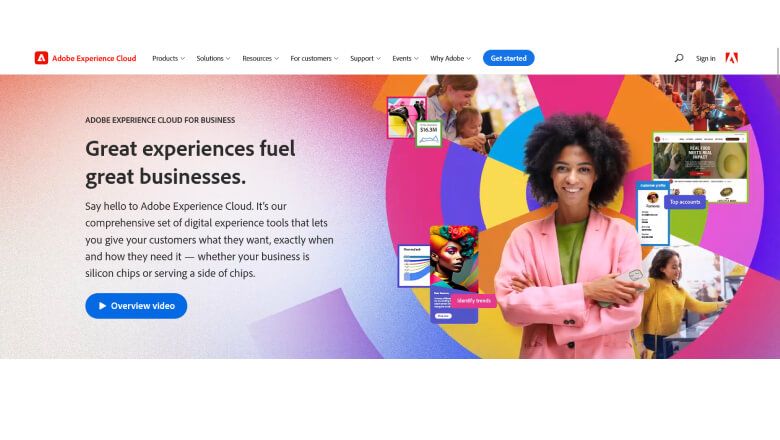
Adobe Experience Cloud has a 3.9-star rating 5 on G2 and 8.6 out of 10 on TrustRadius.
Adobe Experience Cloud is a cloud-based solution that helps brands manage and optimize their customer experience across all channels, including web, mobile, email, social media, and many more.
It helps B2B and B2C brands to manage and deliver personalized customer journeys across multiple platforms.
The platform helps to combine customer data, analytics, and content management capabilities to help a brand understand its audience better, create tailored customer experiences, and meet its unique needs.
It can run marketing campaigns, track customer interactions, and analyze real-time data. In addition, it also offers a range of tools for creating and managing content for web and mobile apps, emails, and social media.
Further, you can collect customer insights from multiple sources, including offline and online interactions, and optimize them to deliver personalized experiences and improve customer service on all channels.
It also has a range of tools for creating and managing digital content in all possible forms across different channels.
Features:
- Manage real-time customer expectations with Adobe creative workflow and asset management solutions,
- Inter-connected workflows,
- Bring data together with customer-driven insights,
- Numerous tools to create an eCommerce experience.
Pros:
- Easy to use and super convenient,
- 24/7 Customer support,
- Publish content across multiple channels,
- Multi-site management and centralized analytics.
Cons:
- Cloud-based platform,
- Learning graphs might be a little harder,
- No online community to help,
- No free version.
Price: Available on request
3. GetResponse
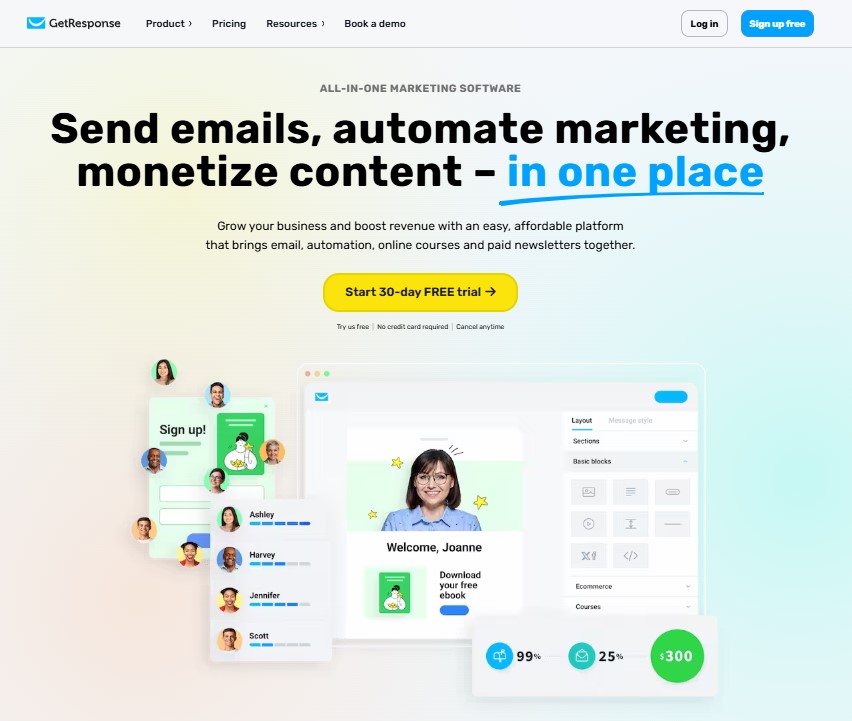
With a G2 rating of 4.3, GetResponse is a comprehensive omnichannel marketing platform designed for businesses of all sizes.
It offers tools like email marketing, marketing automation, SMS campaigns, webinars, and an AI course builder, making it a versatile solution for marketers looking to build personalized customer journeys.
Best suited for small to mid-sized businesses, ecommerce brands, and content creators, GetResponse is perfect for those who need a budget-friendly, scalable platform to manage customer interactions across multiple channels and drive long-term growth.
It can help businesses with a range of marketing activities, including building and nurturing customer relationships through automated email sequences, running promotional campaigns, and launching webinars to generate leads.
GetResponse also enables businesses to create and sell online courses using its AI-powered course builder, which is ideal for creators and educators.
For ecommerce brands, GetResponse offers features like abandoned cart reminders, product recommendations, and transactional emails, helping to increase conversions and revenue.
Additionally, marketers can manage SMS campaigns to reach customers with time-sensitive offers, ensuring consistent engagement across multiple touchpoints.
Features:
- Create personalized, automated email campaigns to engage your audience.
- Build complex customer journeys and workflows with ease.
- Reach your audience with timely, targeted messages via email, popups, SMS, push notifications, webinars, and more.
- Launch and monetize online courses without technical hassle.
- Host interactive webinars to connect with your audience and generate leads.
- Boost revenue with abandoned cart reminders, product recommendations, and transactional emails.
Pros:
- User-friendly interface, suitable for beginners and advanced marketers.
- Budget-friendly pricing plans with scalable options.
- 24/7 customer support and dedicated onboarding
- AI-powered tools like the course builder streamline content creation.
- Supports multiple channels, including email, SMS, and landing pages.
- Strong ecommerce features like abandoned cart reminders and product recommendations.
Cons:
- Some advanced features have a learning curve.
- SMS and transactional emails features available only in the enterprise plan.
- Limited CRM functionality.
Pricing: Free plan + 30 day free trial of premium features
4. Glassix
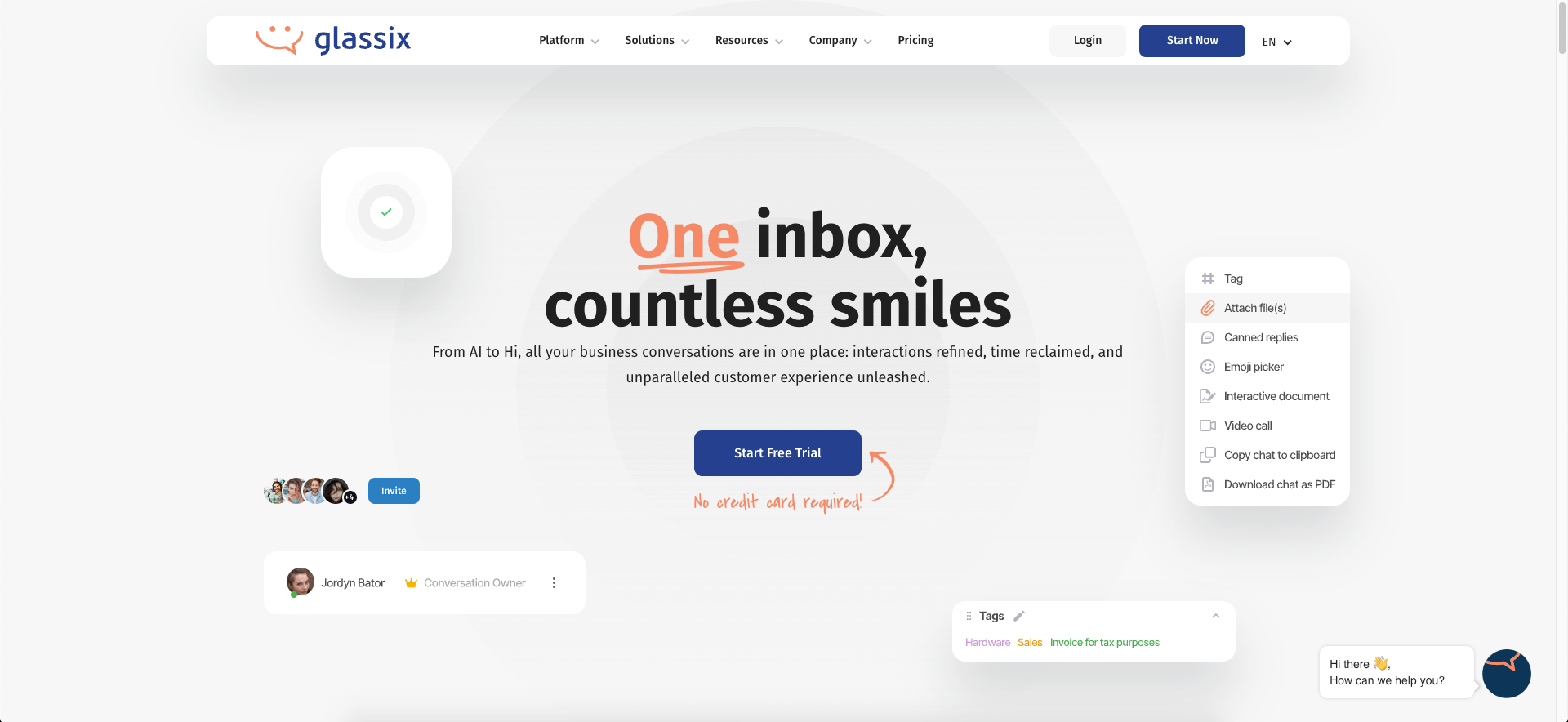
Glassix emerges as a standout in the omnichannel software, boasting impressive ratings of 4.7 on G2 and Capterra.
The platform is designed for businesses seeking to seamlessly improve customer engagement across multiple channels, addressing the specific and most pressing use cases for support, marketing, and sales teams.
Glassix’s AI-powered omnichannel solution transforms marketing by enabling seamless interaction across various channels like SMS, Email, WhatsApp, Apple Business Messages, and Messenger.
Its advanced AI chatbot facilitates 24/7 lead engagement, efficient lead scoring, and personalized customer experiences.
This integration of multiple communication platforms and the ability to maintain customer history and past interactions makes Glassix a genuinely powerful omnichannel tool, effectively improving marketing strategies and ROI.
Features:
- 24/7 AI Chatbot: Provides continuous lead engagement and qualification.
- Personalized Customer Experiences: Customizes interactions to each user’s preferences.
- Automated Lead Routing: Uses AI to distribute leads efficiently.
- Real-Time Feedback Collection: Collects insights to refine strategies quickly.
- Improved Customer Engagement: Enhances brand loyalty through tailored interactions.
Pros:
- Improved Lead Conversion: Boosts rates through targeted engagement.
- Efficient Marketing Spend: Increase ROI with AI-driven insights.
- Seamless Channel Integration: Streamlines marketing across various platforms.
- Data-Driven Decision Making: Uses real-time analytics for strategy
Cons:
- Learning Curve: Requires familiarization with advanced AI features.
- Limited Documentation: May lack comprehensive guides for all functionalities.
Pricing: 30-day free trial available, then $49 per month
5. Priority Software
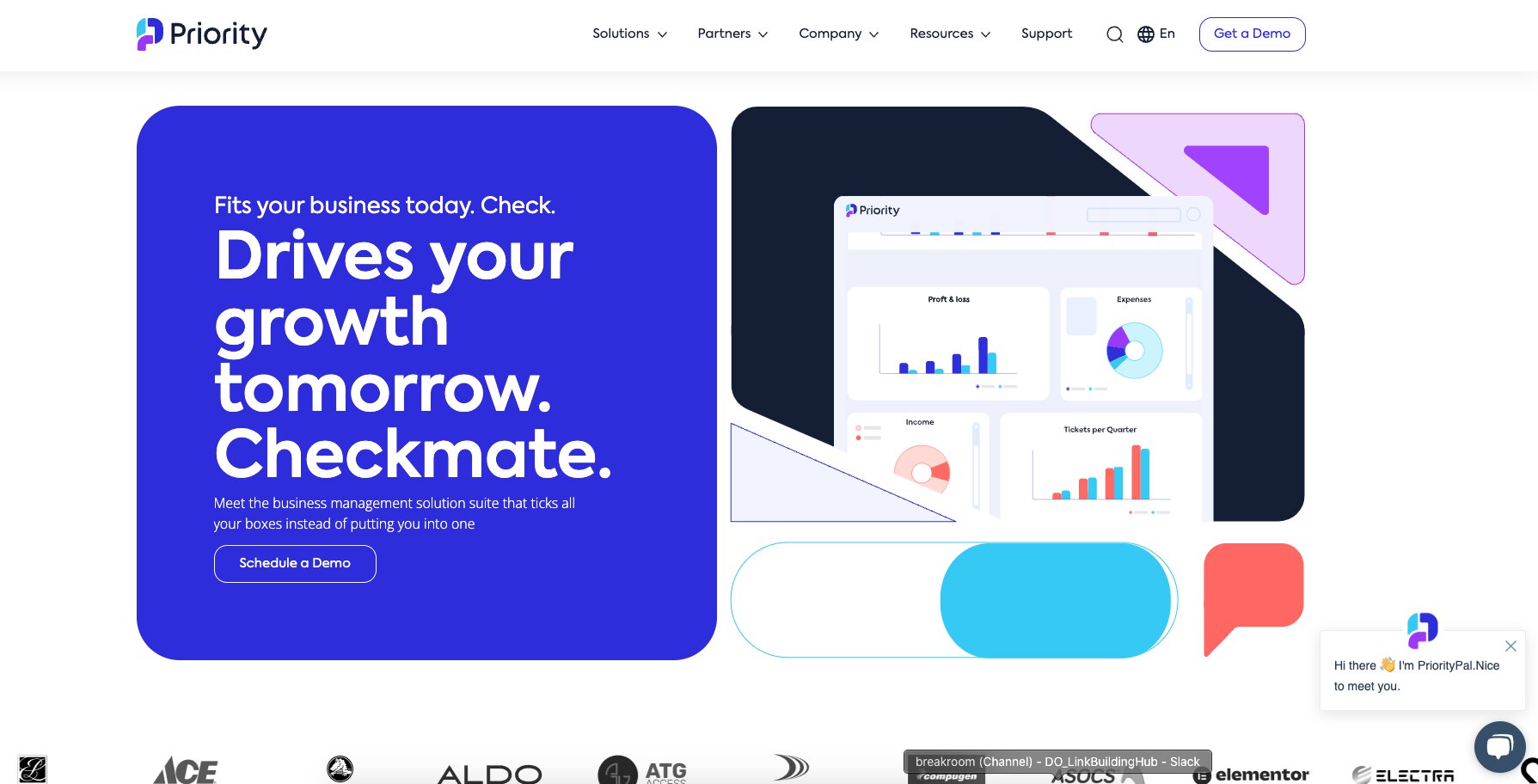
Priority Software is a cloud-based retail ERP and POS solution that helps businesses manage all their brick-and-mortar and commerce operations in one place.
This platform covers it all, whether it’s Point of sale, head office, promotions, inventory, finance, logistics, or HR. It’s perfect for B2B and B2C companies looking to create an omnichannel customer experience, streamline their processes, and improve efficiency.
The platform is designed to help businesses manage their operations across multiple channels, known as omnichannel. Priority Software also combines customer data and real-time analytics to help businesses better understand their audience.
This allows companies to create personalized experiences for their customers, no matter which channel they’re using.
In addition to these features, the platform offers tools for managing promotions and loyalty programs across web, mobile, and store POS. This makes it easier to deliver consistent and engaging experiences to customers.
Features:
- Omnichannel Management: Seamlessly handle business operations across different channels.
- Real-Time Data Analysis: Get live insights to make better business decisions.
- Comprehensive ERP Solution: Covers everything from finance to HR.
- Flexible Customization: Adjusts to fit your business needs.
- Cloud-Based Access: Manage your business from anywhere.
Pros:
- Simplifies business operations by integrating all processes.
- Strong customer support available.
- Suitable for businesses of all sizes.
- Easy to manage everything in one place.
Cons:
- It may take some time to fully learn and implement.
- Some advanced features might require a learning curve.
- Pricing details are available on request.
Price: Available on request
6. Revealbot
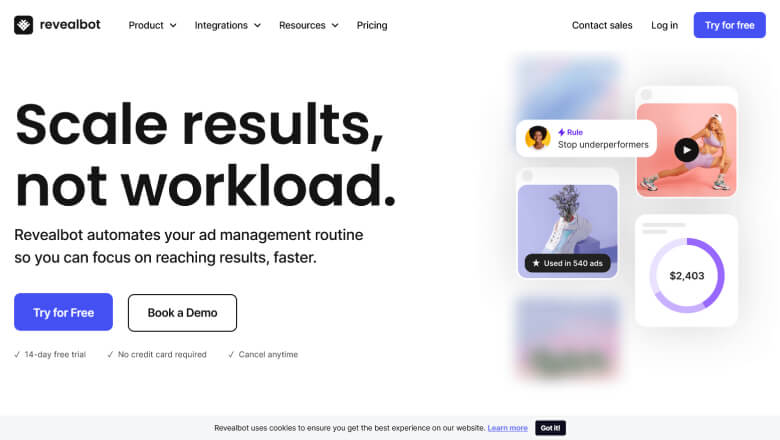
Revealbot is another powerful omnichannel platform designed to help businesses automate paid ad campaigns across platforms like Facebook, Google, Twitter, and Snapchat.
With Revealbot, you can automate a lot of the work. The platform allows you to boost, pause, or adjust your ads based on their performance as frequently as every 15 minutes.
This means you can focus on other aspects of your business while Revealbot takes care of the rest.
You can choose from pre-defined metrics and actions to tailor your automation to your goals or create custom metrics and actions for more specific needs.
In addition, it allows you to create real-time alerts with your ads’ performance and get notified via email or Slack when a setup is triggered.
It also makes it easy to monitor cross-platform performance that works with Google Analytics, Google Adwords, MailChimp, and many more.
Features:
- Set of tools to launch effective ads, boost the best-performing ads, and replicate the successful ones,
- Create bulk advertisements across different segmented audiences and channels,
- Create a lookalike audience to get high-volume sales,
- Manage all your advertisements and campaigns in one place,
- Analyze your ad’s performance and optimize it.
Pros:
- Offer numerous tools,
- Simple drag and drop editor,
- Integrate with popular platforms,
- Excellent customer support,
- Track and analyze performance.
Cons:
- Pricing might look high for small businesses
Pricing: $99 per month
Build trust & FOMO
Highlight real-time activities like reviews, sales & sign-ups.
7. Shopify Plus
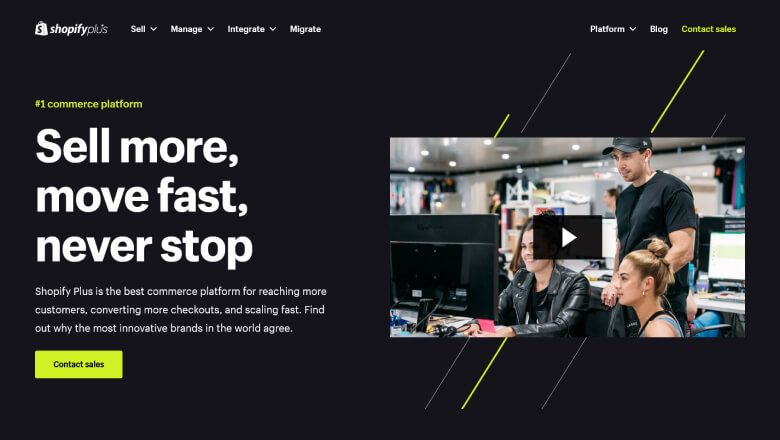
Shopify Plus goes beyond its basic e-commerce service by providing additional functionality to help businesses thrive.
One of its standout features is a vast selection of sales channels, allowing you to sell your products through various mediums.
It empowers businesses to expand their reach across multiple channels, optimize operations, and deliver a superior shopping experience.
With its robust capabilities, Shopify Plus streamlines product management, marketing campaigns, and customer interactions into one cohesive hub.
In addition, it offers a range of automation tools and capabilities to improve your eCommerce operations.
You can automate frequent tasks, like inventory management, customer notifications, and order processing, using Shopify Flow to improve operational efficiency across your eCommerce site.
Further, the Shopigy launchpad is a scheduling tool that helps you automate campaigns and sales.
Key Features:
- More Customization Options.
- More automation with tools like Shopify Flow, Shopify Launchpad, and more.
- Dedicated customer support team.
- Set multiple stores.
Pros:
- Highly Scalable
- Endless Customization options
- User-friendly
- Data organization
Cons:
- High service charges
- Slow response time
- Limited basic features
Price: $2000 per month
8. BigCommerce Enterprise
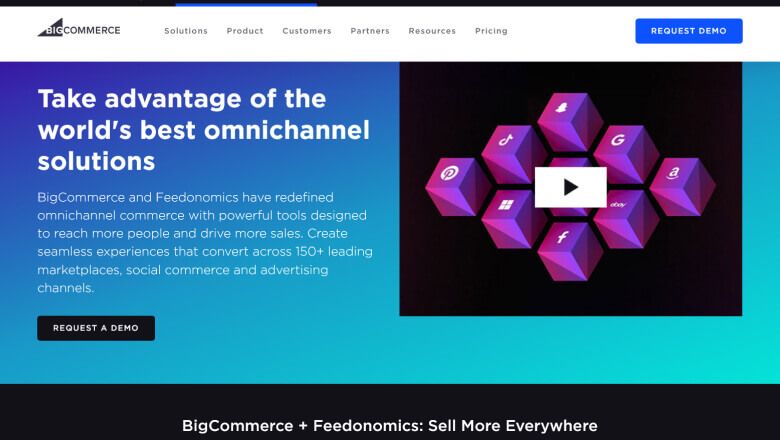
Big Commerce is rated 8 out of 10 on Trust Radius and 4.2 out of 5 on G2.
BigCommerce is a powerful e-commerce platform that blends enterprise-level functionality with a versatile platform and a wide range of third-party applications.
It offers a comprehensive online shop and a unique feature combining online and offline sales.
By partnering with Feedonomics, BigCommerce provides an unmatched omnichannel selling experience by syncing your product catalog across all sales communication channels.
This integration ensures that your products are displayed to customers at the right time and place, driving your digital business forward.
But that’s not all. BigCommerce’s omnichannel platform also enhances brand engagement across all platforms and shops.
With consistent shopping experiences across all major marketplaces and social eCommerce sites, you can make your brand stand out and attract potential customers.
The platform makes connecting your BigCommerce store to Google, Facebook, Instagram, eBay, Wish, and Mercado Libre easy, providing unparalleled reach for your brand.
Features:
- Feed Optimization and Syndication tailored
- Use tools like Feedonomics and Codisto to sell, advertise, and grow across digital channels, social commerce, and search engines.
- Seamless integration with Meta, Google, Wish, eBay, and Mercado Libre.
- Use POS partners like Zettle, Clover, Square, Heartland Retail, and many others to automate syn with offline stores.
Pros:
- Priority customer support
- Deep integration with several Google products
- Sync across 100+ channels
Cons:
- Pricing might be a concern for small businesses.
- It can take time to learn the interface.
Price: Available on Request
Related: 10 Best Tips and Tricks to Improve BigCommerce Store Sales
9. NewStore
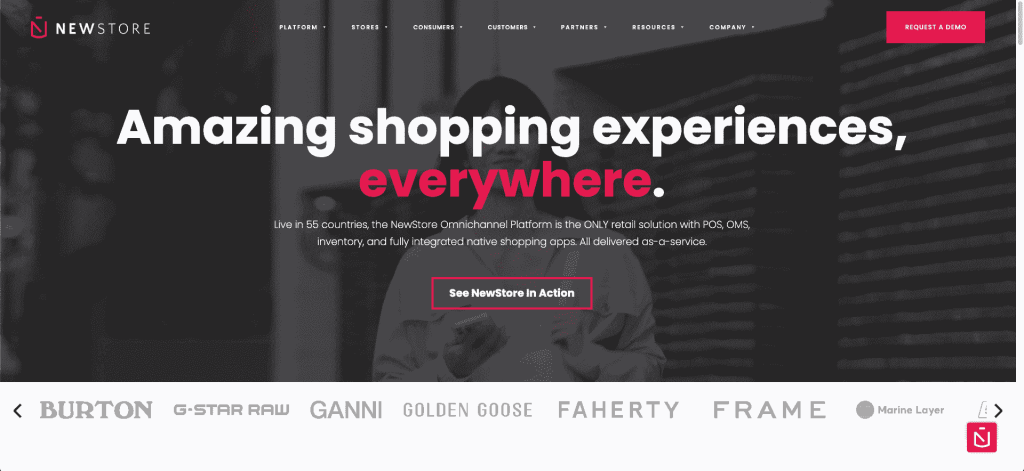
NewStore has 4 out of 5 stars on G2 and no reviews on Trust Radius.
NewStore omnichannel platform is the retail solution with POS, OMS, inventory, and fully integrated native consumer apps.
It helps retailers to deliver seamless and integrated experiences across all channels, including mobile apps, physical stores, eCommerce platforms, and online stores.
The mobile retail platform creates a cloud and mobile-based layer that integrates the retailers/brands’ existing ERP systems and more.
In addition, you can capture views of customers, orders, inventory, revenue, and store performance across multiple channels.
You can easily access real-time inventory data for all SKUs and enterprise locations on a single dashboard.
It allows us to deliver a fantastic shopping experience that store associates and customers love.
Features:
- Complete Data Overview: Customer, inventory, revenue, and performance tracking.
- Instant Data Access: Real-time insights for multiple channels.
- Dashboard Customization: Key metrics like sales and basket size are displayed.
- Easy Integration: Links with eCommerce, order/warehouse management, and logistics.
Pros:
- Offers a wide range of features and tools.
- Seamless Integration.
- Real-time analytics and insights.
- Strong focus on mobile commerce.
Cons:
- Limited Scalability.
- Limited Customization.
- The cost might be high.
Pricing: Available on request
10. Oracle CX Commerce
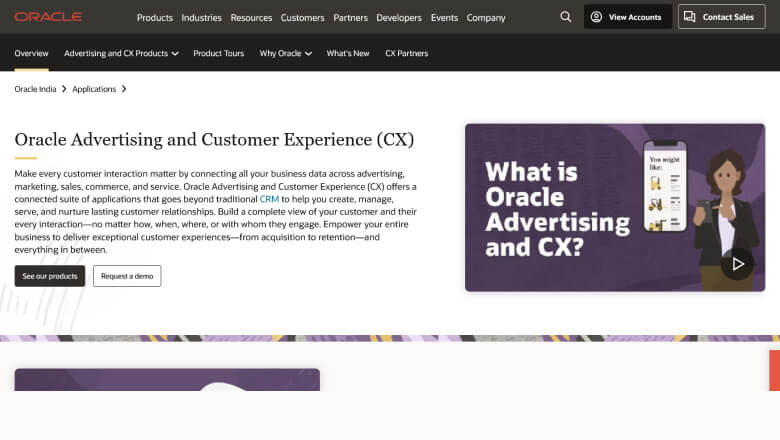
Oracle CX commerce got 8.2 out of 10 stars on Trust Radius, making it a popular omnichannel platform.
It’s a cloud-based tool for customer relationship management, sales, customer service, and eCommerce.
The platform fully features that help B2C and B2B brands create innovative brand experiences across multiple channels.
It helps to provide smooth buying experiences to customers on every platform.
In addition, Oracle CX Commerce integrates with customer data from different platforms, including in-store, online, and mobile integrations.
It also helps to manage inventory across different channels in real time.
It helps provide a personalized shopping experience for each customer, regardless of their channel.
It provides seamless integration with multiple Oracle and third-party applications.
Features:
- Storefront & Marketplace Management
- Multi-source Customer Data Analysis
- Uniform Personalized Services
- Comprehensive Sales Analytics
- Multi-channel Campaign Management
Pros:
- Powerful tools
- Highly Scalable
- Connect experience apps
- Adaptive Intelligence
Cons:
- Security concerns
- No integrated development environment
- Performance difficulties
Price: Available on Request
11. Freshworks
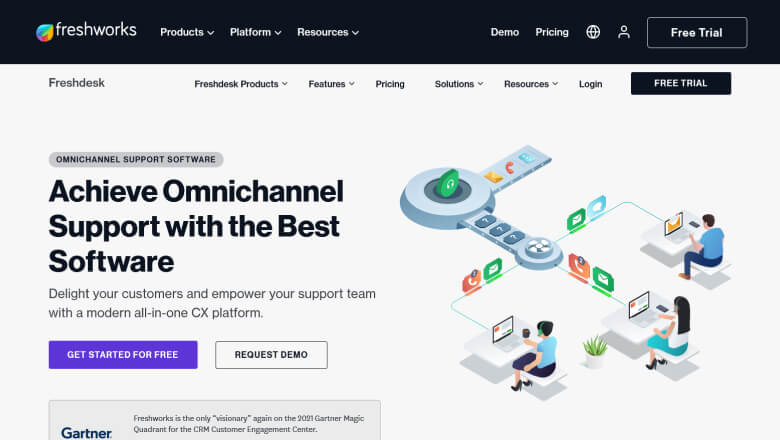
Freshdesk has a 4.4-star rating out of 5, making it a popular omnichannel platform that enables businesses of all types and sizes to deliver stellar customer experience.
It helps to delight your customers and empower your support team with a modern all-in-one CX platform.
It helps to deliver seamless customer service across digital and traditional channels by email ticketing, chat and messaging, cloud telephony, web and Self-service, and Social media.
In addition, it helps to save time by doing repetitive tasks.
Omniroute automatically assigns phone calls, chat messages, and tickets to the right team member and improves efficiency to ensure your team is never overwhelmed by support issues.
With the Omnichannel dashboard, you can see a bird’s eye view of your team’s performance, navigate the tick queues, and re-route the issues to the right team.
Further, the built-in AI chatbots help deliver precise answers to customers’ queries and detect frustrated customers who need a live agent for further assistance.
Features:
- Automatically convert customer emails into helpdesk tickets,
- Engage with customers through live chat and AI chatbots,
- Support customers on Social platforms like Facebook or Twitter and receive notifications using AI-powered social signals monitor.
- Freddy AI chatbot will help customers with queries.
- Unique dashboard to analyze and view performance.
Pros:
- Intelligent Automations
- Powerful platform.
- User-friendly interface
Cons:
- No SMS and other social platform integration
- Limited automation
Price: Free
12. Omnisend
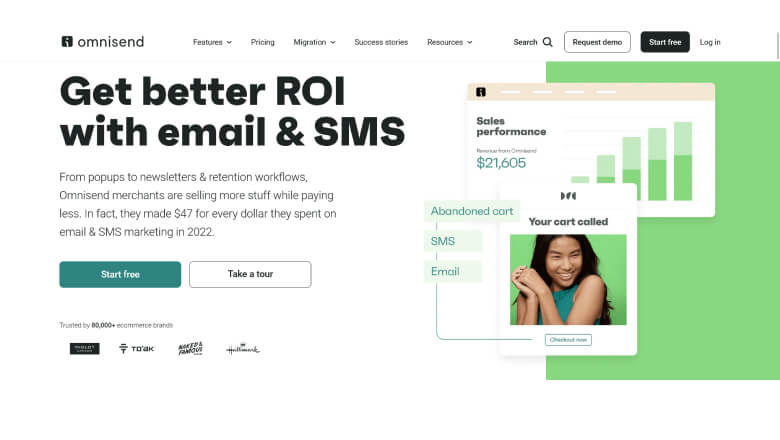
Omnisend has a 4.5-star rating on G2 and 4.8 on the Shopify app store.
Omnisend is a top omnichannel platform designed especially for eCommerce merchants and allows them to drive sales on autopilot mode.
It helps to improve your targeting, customer experience, and shopping experience for your customers.
It helps to streamline your marketing efforts by allowing you to collect customer data, understand their preferences, analyze them, and optimize campaigns through tailored segmentation.
It is suitable for all-size businesses and serves a wide array of industries.
You can reach customers through notifications on multiple channels, through texts, emails, and online push notifications, which is a one-stop solution to manage all.
With the premade templates for messages, headers, and process parameters available on the platform, you can easily approach the target audience with effective marketing campaigns.
In addition, you can test different strategies to see which works best for your brand and attract audiences.
Features:
- A/B testing.
- Drag and Drop the email builder with the library of templates.
- Pre-built eCommerce workflows.
- Drip campaigns.
- Sales Dashboard with advanced campaign reports.
- Email + SMS automation.
Pros:
- Easy to use.
- One-centralized platform.
- Premium automation features.
- SMS, Email, and MMS marketing integration.
- eCommerce integrations.
Cons:
- Slow customer support.
- Limited email customization.
- The free plan has limited features and uses.
Pricing: Free plan available
Omnichannel Platform Selection Tips
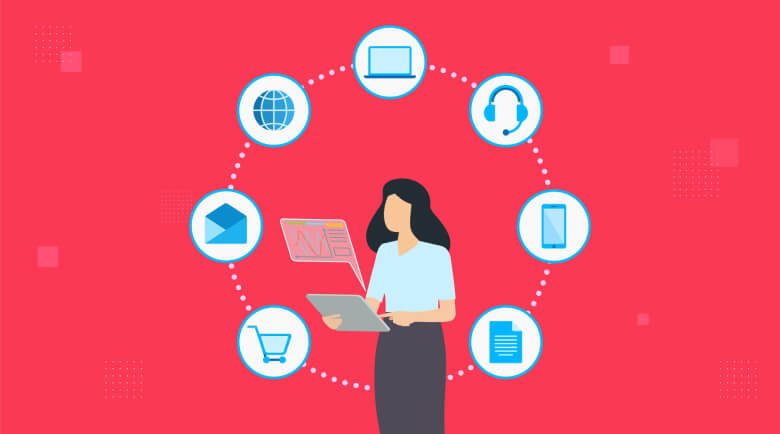
When choosing the omnichannel marketing platform for your business, make sure it is both brand-centric and customer-centric.
This platform helps promote a unified message across all channels and also considers customer preferences and needs.
Here are some key factors to consider-
Channel Support: Ensure the platform offers your preferred channels and aligns with your business needs. It should also allow you to manage interactions across all relevant channels, including offline channels, apps, websites, and social media platforms.
Reporting: Look for a platform that provides in-depth reports and analytics, including real-time data and customer behavior across all channels. That can help you to optimize your omnichannel strategy and improve customer engagement.
Scalability: Ensure the platform can grow as your business scale and needs increase. The media should be able to handle a high volume of traffic, data, and interaction to stay ahead of competitors and provide a seamless experience.
Support: Look for reliable and supportive platforms that help you with training and resources to help you get the most out of the platform. That can help save time learning and exploring the platform and ensure your team manages the platform efficiently.
Integration Capabilities: Ensure the platform can integrate with your existing systems and technologies, such as your CRM, ERP, POS, and other marketing tools. Seamless Integration can save time and reduce errors.
Choosing the right omnichannel platform requires careful consideration of your business needs, customer preferences, and platform capabilities. Make sure to choose one that fits your needs and helps drive sales.
Also Read: 50 Best Conversion Rate Optimization Tools – Top Picks
Numerous Omnichannel platforms offer different features and integration options; those differ in pricing, use, and reporting systems. We have listed the top 10 omnichannel marketing platforms that can be the best fit for your business.
Conclusion
In today’s fast-paced digital world, businesses must provide seamless customer experiences across all channels and touchpoints.
Omnichannel platforms offer a comprehensive solution to help businesses manage customer relationships efficiently and effectively.
With so many options available in the market, choosing the right platform can be overwhelming. We hope our article has provided valuable insights and information to help you make an informed decision.
However, if you want to learn more about how omnichannel platforms can help take your business to the next level, we encourage you to keep exploring and researching.
With the right platform, you can enhance customer experiences, increase revenue, and stay ahead of the competition.
